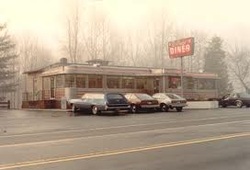
The limbs that remained were fractured and blackened like the inside of an old chimney. The actual trunk of the tree was twisted in such a shape that it more closely resembled a burnt twizzler. And even with its many deficiencies the plant soon proved to be a beacon of hope and a symbol of the embattled city itself. It’s stubbornness and refusal to wilt under seemingly insurmountable odds gave the people of the city a momentary respite and soon became the cornerstone of many of the makeshift memorials that were erected in the days that followed the attack.
As masses of people flocked to the site with pictures of their loved ones in hand, hoping to find a clue as to what happened, the tree remained securely in the ground. Days turned to weeks and weeks into months. The seasons changed yet the tree endured. It even gained some sort of cult status as it was deemed the “survivor.”
As the demolition and removal progressed into construction and revitalization it seemed as though the familiar facades of the corporate towers would finally surround the tree. That was the plan; at least until mother nature imposed her will.
It started off as a rather usual day in every aspect. By mid day, though, the dark clouds had begun to form, covering the area like a bad toupee. The howling winds followed and then the torrential downpour began. Within minutes the storm intensified and soon people took cover and the weathermen warned of severe property damage and flood possibilities.
The storm was over in less than an hour, off to terrorize another city. The tree that had stood its ground so gallantly in the attacks before didn’t stand a chance. Maybe it was that it had been weakened over the years and it was just a matter of time. Whatever the reason, the roots had been pulled from the ground and the plant was tossed some thirty yards from its original resting place. Other things such as personal property and power lines took priority in the cleanup effort.
But in the weeks that followed news of the now famous tree had spread and local efforts were being taken to revitalize the tree back to its original health. The city’s parks department took on the job and vowed to nurse the plant back to health. The tree’s story even got a blurb in the Times local section.
It was brought north to Van Cortlandt Park and after weeks of careful rehabilitation the tree seemed to be back to normal. Sure, there were the scars of the attacks on that beautiful late summer day in September a year back but the bones of the plant remained, somehow, intact. In a way, the marks and discoloration left from the attacks were symbolic of the city itself. Torn but not dead. Down but not out. Injured but resilient.
Even the Mayor got in on the event as he held a ceremony to replant the tree in its original location. He claimed that it stood as a figure of hope and strength in these trying times. People stood and cheered. And for that one day even the environmentalists liked the mayor.
Patrick Trotti is a 24 year old native New Yorker pursuing a degree in Creative Writing. The rest is just needless details.





 RSS Feed
RSS Feed